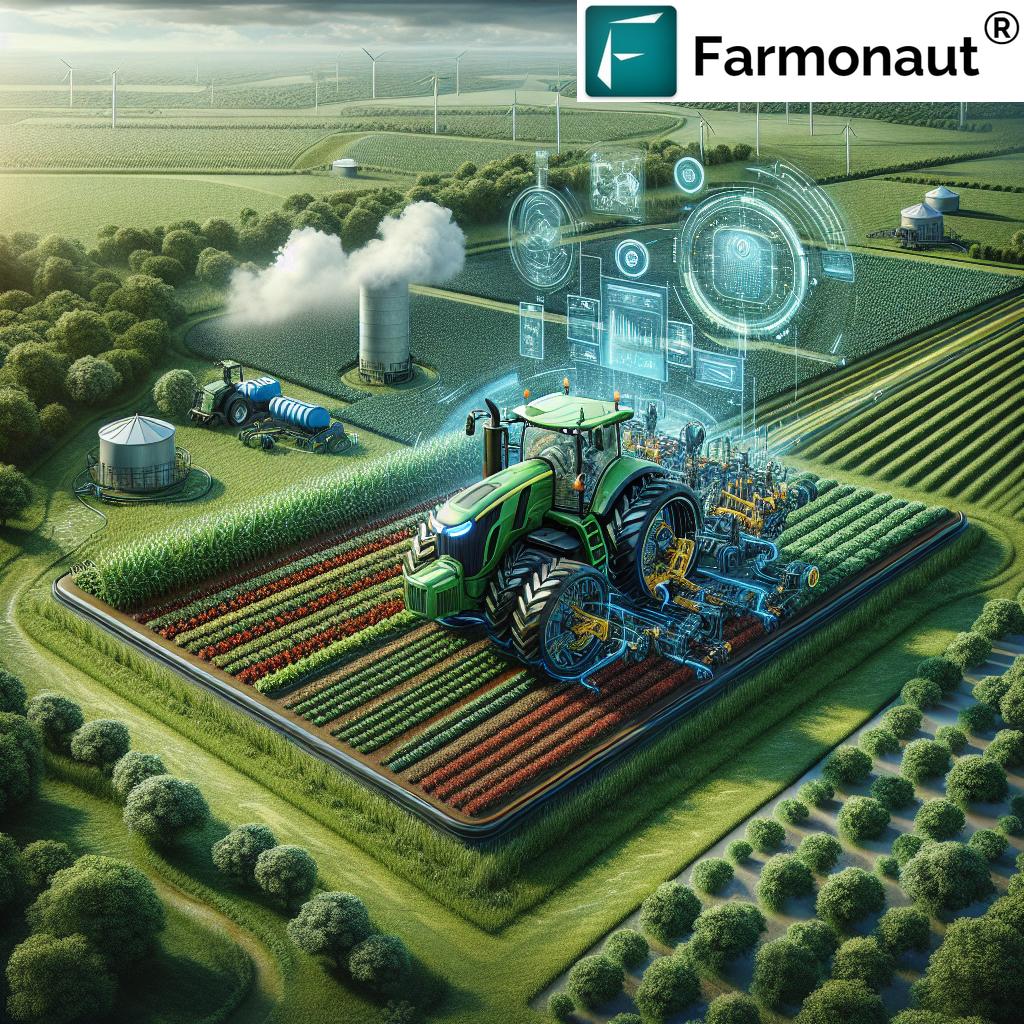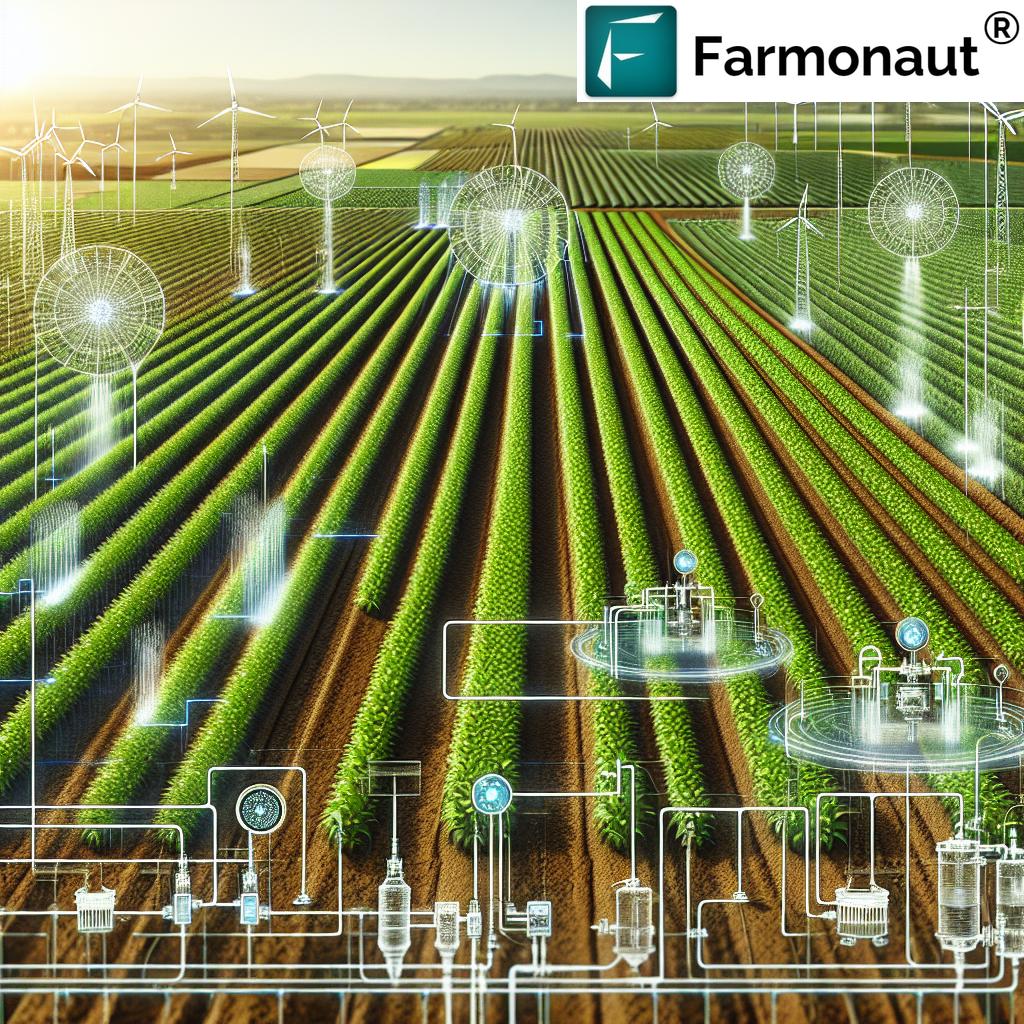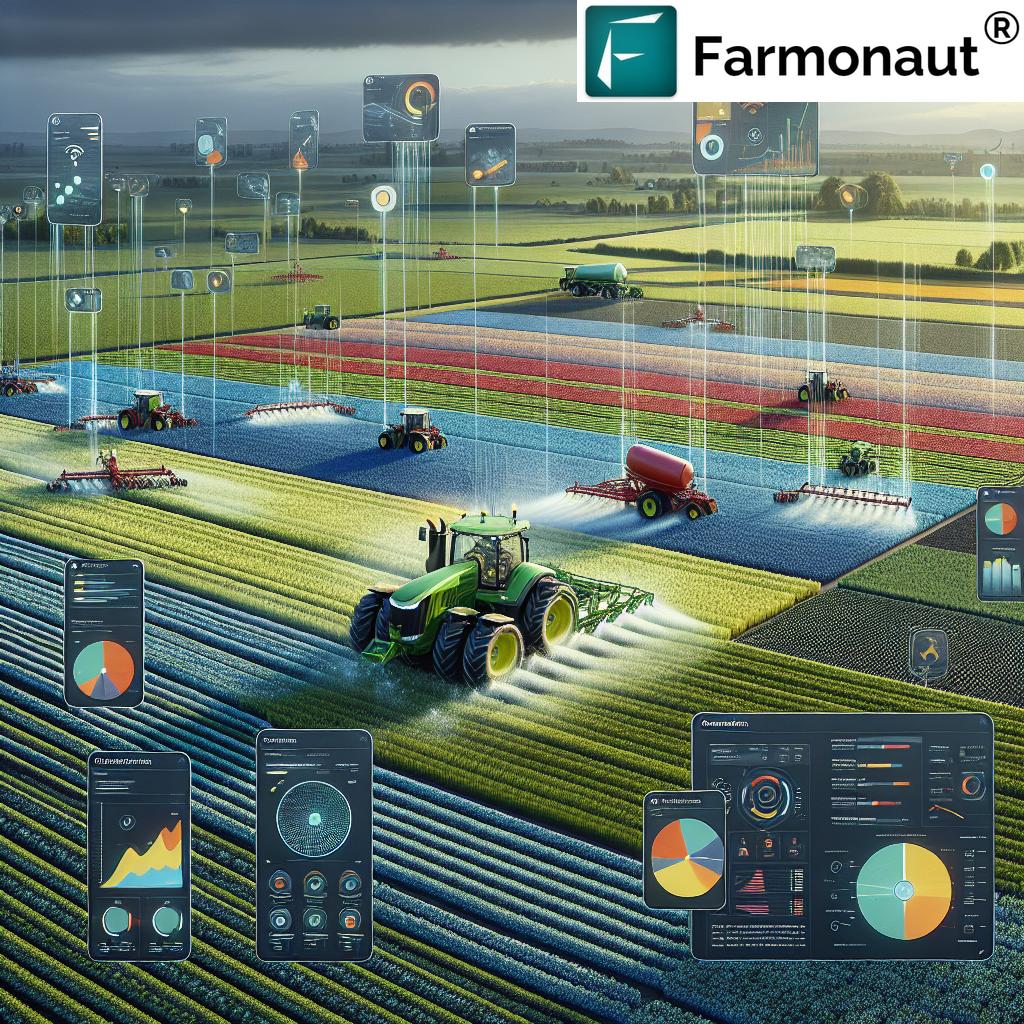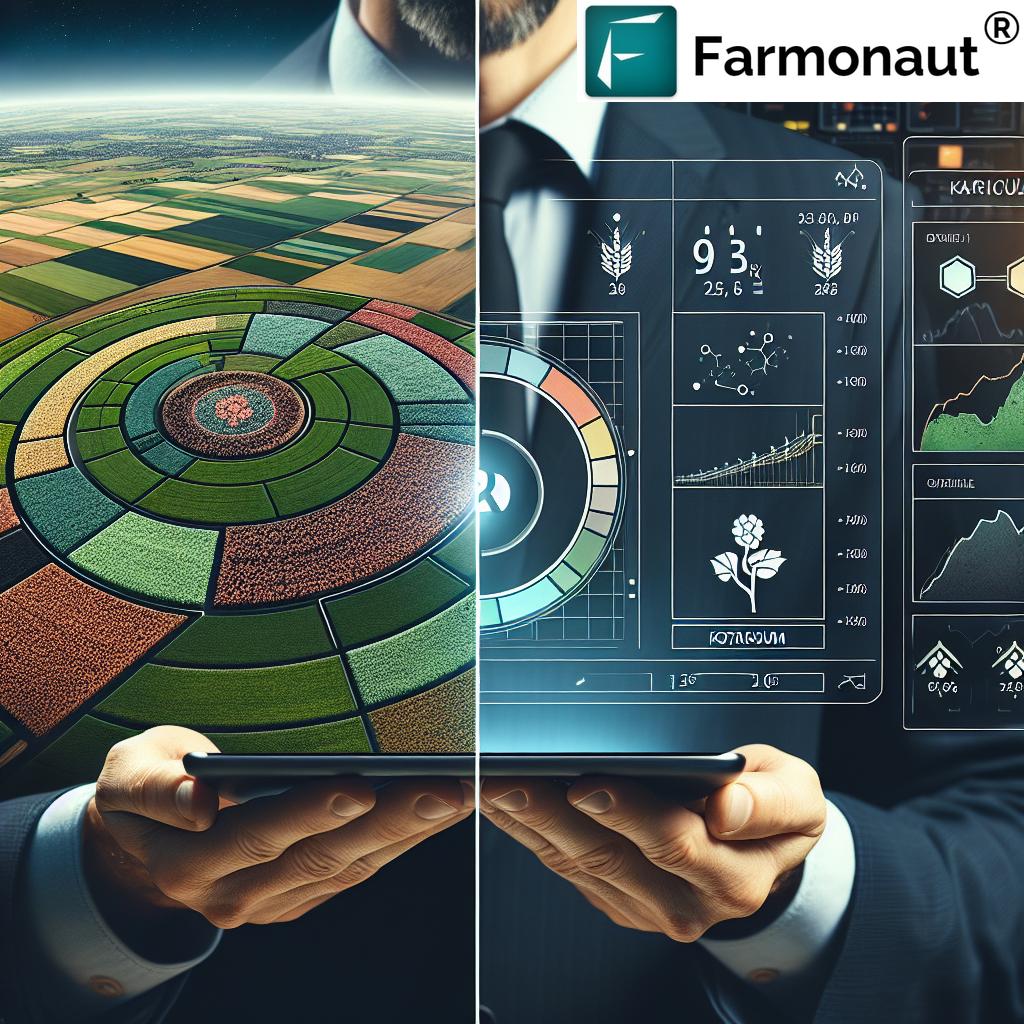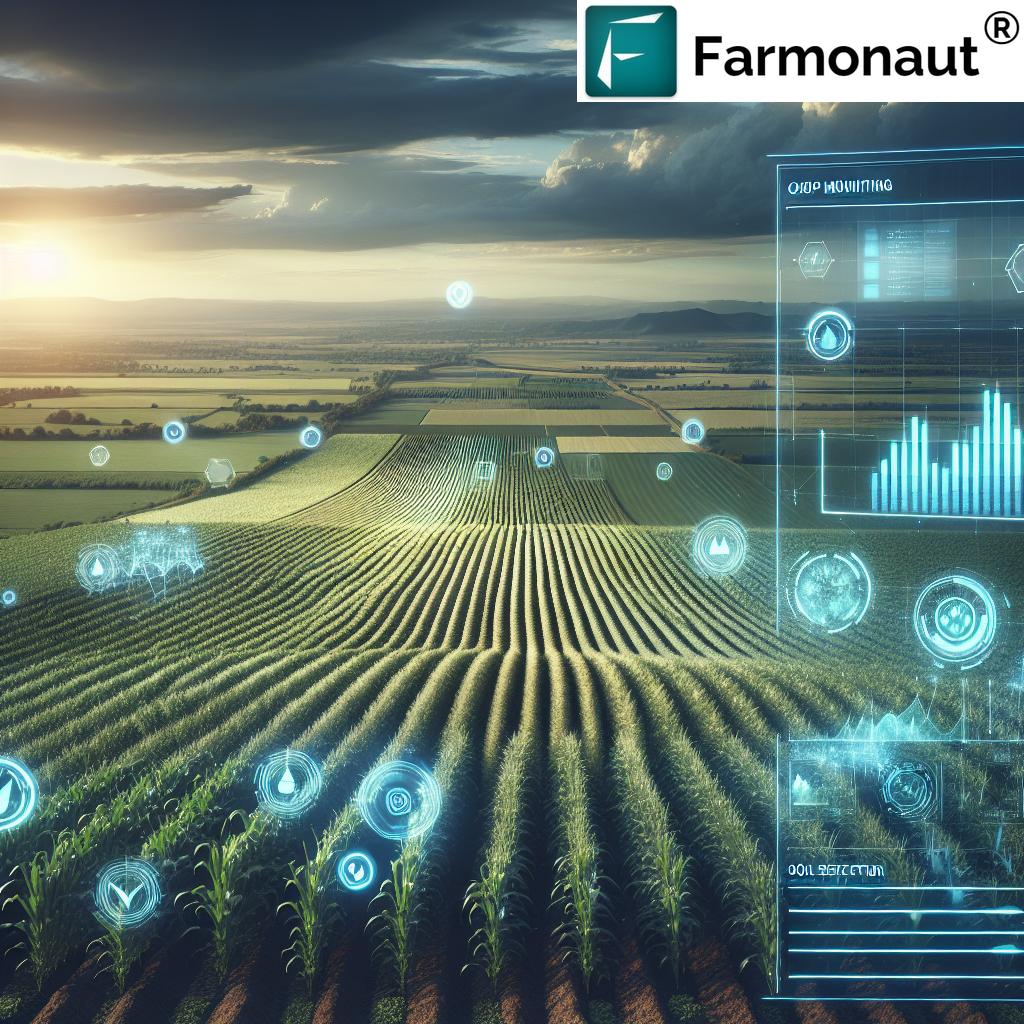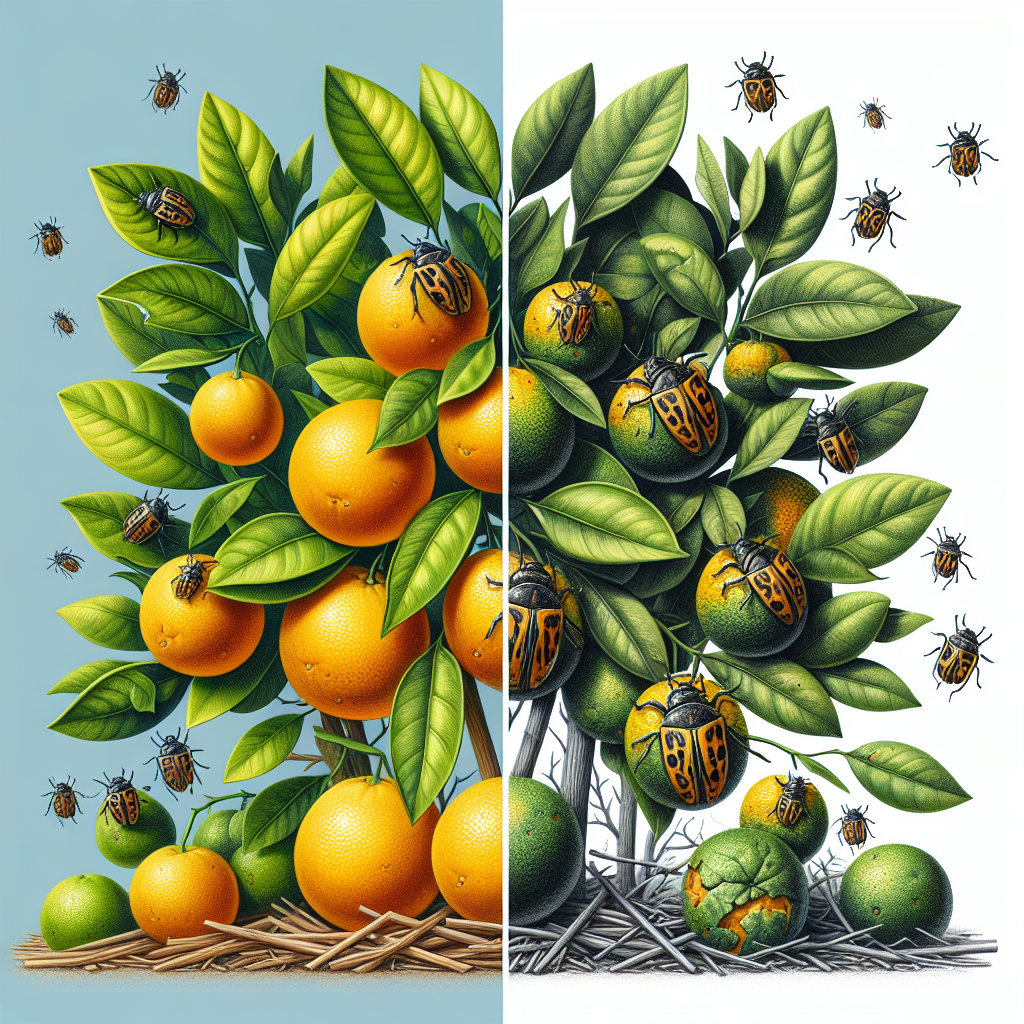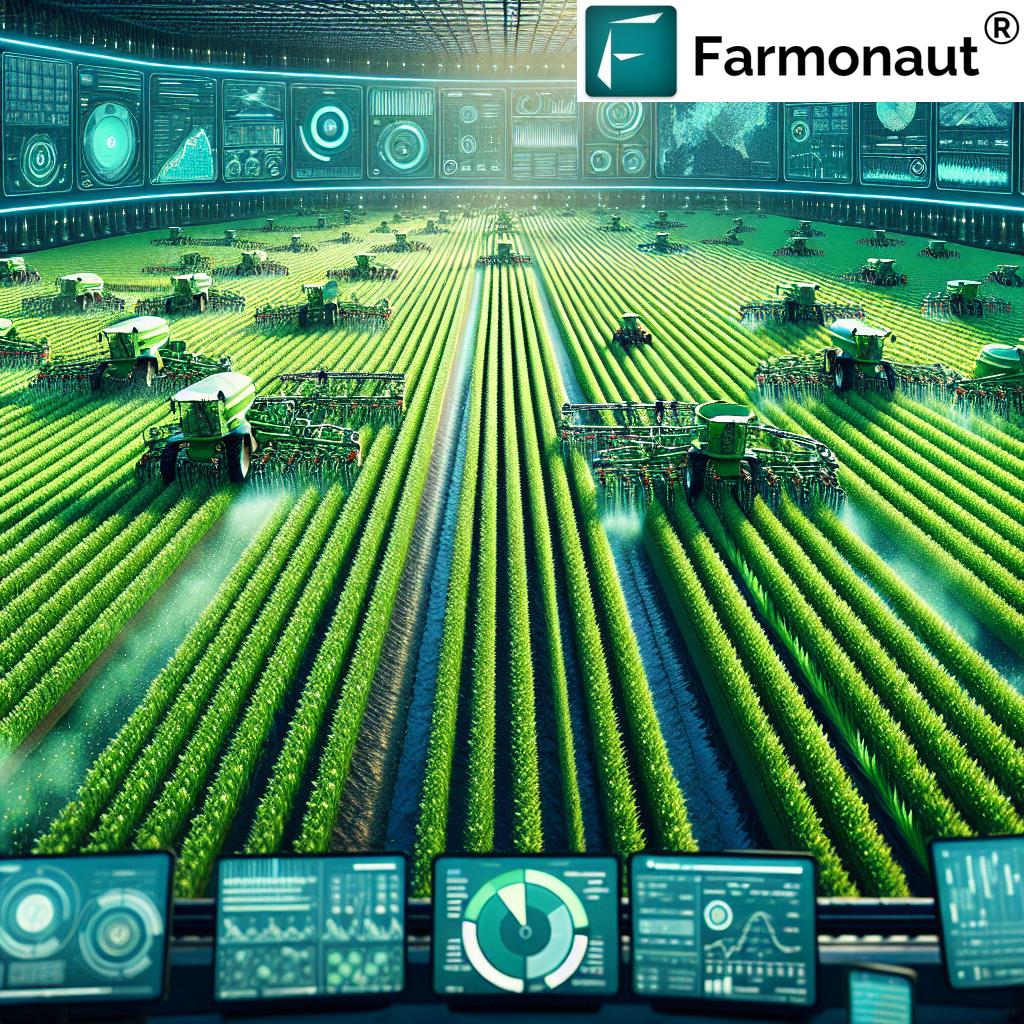Table of Contents
- Introduction: Agritech AI and the Evolution of Precision Farming
- What is Agritech AI?
- “Agritech AI can analyze over 1 million crop data points per acre, optimizing precision farming decisions in real time.”
- 1. Precision Farming Technology & Resource Management
- 2. Crop Health Monitoring and Disease Detection
- 3. Autonomous Farming Equipment: The Future of Farm Operations
- 4. Smart Irrigation Systems: Maximizing Water Efficiency
- 5. Agricultural Supply Chain Optimization with AI
- 6. Livestock Monitoring Systems: Revolutionizing Animal Health
- 7. AI-Powered Forest Management and Conservation Efforts
- 8. Predictive Maintenance in Agriculture
- 9. Innovative Weed Management with Image Recognition
- “AI-driven precision farming has increased crop yield efficiency by up to 30% in tech-adopting farms worldwide.”
- Comparison Table: Top 10 AI Applications in Precision Farming
- Farmonaut: Affordable, Scalable Precision Agritech Solutions
- Challenges and Future Prospects of Agritech AI
- Frequently Asked Questions
- Summary and Conclusion
Agritech AI: 10 Powerful Ways Transforming Precision Farming
Agritech AI is redefining agriculture, introducing a technological revolution in how we manage, monitor, and optimize precision farming technology and resource allocation. From leveraging artificial intelligence (AI), data analytics, and machine learning algorithms to harnessing satellite imagery, this digital transformation empowers us—farmers, agronomists, and supply chain stakeholders—to make informed decisions using real-time agricultural data.
As the demands on agriculture, food security, and sustainability increase worldwide, it is critical to adopt agritech solutions that address efficiency, productivity, and environmental impact. This comprehensive guide spotlights the top 10 ways Agritech AI is accelerating innovation in precision farming, with a special emphasis on transformative platforms like Farmonaut, which is revolutionizing satellite-based farm management and making technology accessible and affordable for all farmers globally.
What is Agritech AI?
Agritech AI refers to the integration of advanced artificial intelligence, machine learning, data analytics, and automation within the agricultural sector. By harnessing tools such as satellite imagery for farming, autonomous farming equipment, crop health monitoring systems, and predictive algorithms, we can analyze vast datasets for smarter decision-making.
The ultimate goal is to boost productivity, reduce costs, and support sustainable management of resources. Platforms like Farmonaut spearhead this transformation by providing affordable, scalable, and accessible large-scale farm management solutions using real-time satellite data. This is shaping the future of both farming and global food systems.
1. Precision Farming Technology & Resource Management
How AI in Agriculture is Transforming Resource Efficiency
At its core, precision farming technology uses AI, data analytics, and field sensors to enable farmers to make informed decisions on resource management. By analyzing real-time datasets from drones, sensors, and satellite imagery, we can assess soil health, moisture levels, and nutrient content, thus guiding optimal irrigation schedules, fertilization plans, and planting strategies.
- Data-driven insights: Modern platforms, such as Farmonaut, deliver satellite-based crop health monitoring, soil moisture analytics, and historical field trends, helping us minimize resource waste and maximize yield.
- AI recommendations: By leveraging AI algorithms, we can automate recommendations for fertilization and watering schedules customized to field conditions, crop stage, and local weather forecasts.
- Sustainability: Enhanced visibility into farm data enables sustainable resource allocation and reduces our environmental impact.
Access to this technology is now easier than ever. Platforms like Farmonaut allow us to manage our farms via Android, iOS apps, or the web, bringing precision agriculture within everyone’s reach.
To dive deeper into how satellite-driven insights provide a competitive advantage, check Farmonaut’s large-scale farm management platform, which provides plantation analytics, resource optimization, and compliance support for agribusinesses.
2. Crop Health Monitoring and Disease Detection
Leveraging AI and Satellite Data for Early Detection
Proactive crop health monitoring is a game-changer for minimizing crop losses and maximizing productivity. AI systems analyze NDVI (Normalized Difference Vegetation Index) from satellite images, along with images captured by drones and sensors, to identify issues such as disease outbreaks, nutrient deficiencies, and pest infestations—sometimes before human eyes can even spot them.
- Satellite and multispectral imagery: Platforms like Farmonaut provide detailed heatmaps, highlighting areas of concern so we can respond swiftly.
- AI-based advisory systems: Farmonaut’s Jeevn AI delivers timely recommendations for intervention, such as targeted spraying or field inspection, reducing unnecessary pesticide usage.
- Field-level disease detection: Machine learning models analyze millions of data points to predict outbreaks, allowing us to minimize losses and boost quality.
Farmonaut’s real-time crop monitoring solution is designed for individual farmers, cooperatives, and agribusinesses alike—no expensive drones or additional hardware are required—just actionable intelligence delivered via apps and web dashboards.
We also recommend exploring their blockchain-based crop traceability solution, which assures end-to-end transparency and adds trust throughout the supply chain.
3. Autonomous Farming Equipment: The Future of Farm Operations
Combining AI, Automation, and Analytics to Redefine Productivity
Autonomous farming equipment—think smart tractors, drone sprayers, robotic harvesters—are bringing a new era of efficiency to farms worldwide. By integrating AI and sensor data, these machines perform field operations with minimal human intervention, reducing labor requirements and optimizing outcomes.
- Navigation and task execution: Using GPS and sensors, autonomous tractors and harvesters can navigate fields, plant seeds with precision, apply crop protectants intelligently, and perform harvests at the ideal time.
- Safety and continuous operations: Smart machinery detects obstacles and adapts to field conditions, ensuring safety for people and crops alike.
- Cost savings: Automation directly reduces operational costs and boosts productivity, especially for large-scale farm management.
Efficient fleet management is also possible through digital platforms. Farmonaut offers fleet tracking tools that empower agribusinesses to monitor assets, optimize machinery usage, and ensure cost-effective, safe operations across vast territories.
4. Smart Irrigation Systems: Maximizing Water Efficiency
Sensor-Driven Water Management for Sustainable Agriculture
Efficient irrigation is essential for sustainable agriculture, especially in regions facing water scarcity. Smart irrigation systems use sensors and AI to monitor soil moisture, crop requirements, and weather forecasts, allowing us to optimize watering schedules and dramatically reduce water wastage.
- Real-time decision-making: By combining data from soil moisture sensors and satellite imagery, we can supply exactly the hydration our crops require—no more, no less.
- AI predictions: Advanced platforms help predict future irrigation needs based on field conditions and weather changes.
- Environmental and cost benefits: Conserving water resources not only saves money, but also supports environmental sustainability.
With Farmonaut’s satellite-powered moisture analytics and irrigation management, we gain actionable dashboards that alert us to field areas suffering from under- or over-irrigation, enabling actual water savings and improved yields at scale.
5. Agricultural Supply Chain Optimization with AI
AI-Driven Logistics for Timely Delivery and Reduced Waste
The agricultural value chain is long and complex, yet AI and data analytics now offer end-to-end optimization from farm to fork. By analyzing market data, predicting demand, and automating inventory management, AI-powered systems enable us to reduce waste, improve logistics, and ensure timely delivery of produce.
- Demand forecasting: Machine learning algorithms monitor trends and consumer behavior, helping us plan better planting strategies and optimize harvest timings.
- Blockchain-based traceability: Farmonaut’s traceability solutions use blockchain technology to ensure every step—from cultivation to end consumer—is transparent and secure, building trust and reducing fraud.
- Finance and insurance efficiency: The satellite-based crop loan and insurance verification system from Farmonaut makes loan approvals faster, reduces fraud, and boosts financial inclusion.
For developers seeking direct access to robust agricultural datasets, Farmonaut’s satellite-data API and developer documentation facilitate seamless data integration and customization for business, research, or agri-tech projects.
6. Livestock Monitoring Systems: Revolutionizing Animal Health
Sensors and AI Algorithms for Improved Livestock Productivity
While most focus on crops, agritech AI also transforms livestock management. Today’s livestock monitoring systems utilize sensors, cameras, and AI platforms to analyze animal activity, detect early signs of illness, and optimize feeding schedules.
- Automated health detection: Smart tags and wearable devices monitor physiological parameters such as movement, temperature, and appetite, alerting us to abnormal patterns for timely intervention.
- Optimized resource allocation: AI-powered analytics recommend feeding and breeding strategies that boost productivity and welfare.
- Environmental monitoring: Understanding field conditions and their impact on herds allows for better pasture and grazing management.
Integrated data analytics platforms increasingly combine animal-centric and crop-centric intelligence, giving us a 360-degree view of a farm’s ecosystem for superior decision-making.
7. AI-Powered Forest Management and Conservation Efforts
Satellite Imagery for Forestry: Early Detection and Proactive Conservation
Forestry is an integral part of agriculture and environmental stability. AI-driven forest management tools leverage satellite imagery and machine learning to monitor vast tracts of land for:
- Forest health assessment: Early detection of disease, pest infestations, or drought stress ensures we can act quickly to preserve forest biodiversity.
- Combatting illegal activity: Real-time surveillance helps authorities detect unauthorized logging and illegal poaching, protecting valuable resources.
- Wildfire prediction: AI models use historical weather and satellite datasets to predict wildfire risks and guide proactive intervention.
- Carbon footprinting: Farmonaut’s carbon footprint tracking offers real-time emission reports, supporting sustainability and compliance for businesses and forest managers.
With agricultural and forestry data seamlessly integrated, decision-makers get a complete environmental snapshot to inform conservation and management policies.
8. Predictive Maintenance in Agriculture
How AI & Sensor Data Reduce Downtime and Extend Machinery Life
Predictive maintenance in agriculture harnesses equipment-mounted sensors and AI analytics to monitor machinery health, predict failures, and schedule necessary repairs—before breakdowns occur.
- Continuous equipment monitoring: Machine learning analyzes temperature, vibration, oil levels, and load, providing early warnings for proactive maintenance.
- Minimized downtime: Timely alerts allow for intervention that keeps operations running, especially critical during planting and harvest seasons.
- Extended asset life: Reducing wear and tear through proactive servicing cuts capital costs and increases machinery lifespan.
Whether managing a single tractor or an extensive fleet, platforms such as Farmonaut Fleet Management help us optimize maintenance schedules and improve overall operational efficiency.
9. Innovative Weed Management with Image Recognition
Targeted, Sustainable, and Environmentally Friendly Weed Control
Weed competition is a perennial problem impacting crop yields and resource allocation. Modern AI-powered weed management uses image recognition and machine learning to identify and precisely target weeds—often in real-time.
- Selective herbicide application: Sprayers equipped with cameras and AI algorithms distinguish crops from weeds, applying chemicals only where needed for reduced environmental impact.
- Laser weeding: Advanced systems utilize robotic arms or lasers guided by AI to remove weeds without harming crops.
- Scalability: These tools are suitable for both small and large fields—making weed management smarter, safer, and more sustainable.
Leveraging satellite imagery and smart analytics from providers like Farmonaut, we can monitor field-level weed pressures and plan interventions that reduce costs and environmental risks alike.
Comparison Table: Top 10 AI Applications in Precision Farming
| AI Application | Estimated Yield Improvement (%) | Efficiency Gain (%) | Sustainability Impact | Key Benefits |
|---|---|---|---|---|
| Crop Health Monitoring | 15-25% | 30% | High (reduced losses, targeted intervention) | Early detection, data-driven recommendations |
| Automated Irrigation | 10-20% | 40% | High (saves water, reduces runoff) | Optimal watering, cost & resource saving |
| Disease and Pest Detection | 12-22% | 35% | High (less chemical use) | Timely action, reduced chemical input |
| Autonomous Equipment | 8-18% | 25% | Medium (lower fuel, less waste) | Lower labor, improved safety/productivity |
| Supply Chain Optimization | 5-15% | 20% | Medium (reduced spoilage, transparency) | Lower wastage, better demand fulfillment |
| Livestock Monitoring | 10-20% | 22% | Medium (welfare, efficient feeding) | Early illness detection, optimized feeding |
| Forest Management | N/A | 30% | High (conservation, carbon storage) | Early fire detection, illegal logging prevention |
| Predictive Maintenance | 5-10% | 18% | Medium (reduced resource wastage) | Lower downtime, longer equipment life |
| Weed Management | 7-16% | 20% | High (less herbicide use) | Selective application, reduced chemical input |
| Carbon Footprinting | N/A | 15% | High (sustainability, compliance) | Tracks emissions, improves reporting |
Farmonaut: Affordable, Scalable Precision Agritech Solutions
In a world where technology is rapidly evolving, Farmonaut stands as a pioneering force in democratizing precision agriculture. With a mission to make cutting-edge agritech accessible for all, Farmonaut’s platform uniquely blends satellite imagery, AI, blockchain, and machine learning to offer holistic solutions for everything from real-time crop health monitoring to transparent supply chains.
Key Features:
- Satellite-Based Crop Monitoring: Real-time, multispectral satellite data for NDVI, moisture analysis, and more—delivered via web and mobile apps.
- Jeevn AI Advisory: AI-driven, field-specific recommendations on crop management strategies, weather forecasts, and intervention plans.
- Blockchain Traceability: Secure, end-to-end product journey tracking for traceability and food safety.
- Fleet & Resource Management: Optimize machinery and transport assets with fleet tracking solutions.
- Carbon Footprinting: Monitor, report, and reduce emissions through environmental monitoring tools.
Farmonaut’s subscription-based model offers flexible pricing for individuals, businesses, and institutions—with easy sign-up and platform access via both apps and web browsers. The API enables developers to build custom agritech solutions using accurate, up-to-date satellite and weather datasets.
Challenges and Future Prospects of Agritech AI
Overcoming Obstacles to Scale, Standardization, and Trust
While agritech AI offers remarkable benefits, several challenges exist:
- Data privacy and security: Managing sensitive farm and supply chain data securely is essential, especially as platforms scale.
- Equipment standardization: Diverse systems and machinery require compatible sensors, software, and integration protocols for seamless operation.
- Environmental regulations: Adhering to regional and national guidelines is vital for responsible technology adoption.
- Education and digital literacy: Successful transition depends on supporting farmers in adopting these technologies and interpreting analytics for clear decision-making.
Looking ahead, advancements in machine learning, AI algorithms, and data integration will continue to drive the evolution of precision farming. As digital infrastructure improves and broader internet connectivity reaches rural regions, agritech solutions like those from Farmonaut will empower more farmers to overcome their unique regional challenges. The result? Greater food security, reduced environmental impact, improved economic stability, and more resilient agricultural systems for generations to come.
Frequently Asked Questions (FAQ) about Agritech AI and Precision Farming
How does AI in agriculture improve crop yield?
By analyzing vast datasets from sensors, satellite imagery, and field devices, AI can predict crop health issues, recommend optimal interventions, and guide decision-making. Early detection reduces losses from pests and diseases, while smart irrigation and fertilization enhance productivity.
What is the role of satellite imagery in precision farming?
Satellite imagery for farming enables us to monitor large-scale farm conditions remotely, track vegetation health (NDVI), monitor moisture content, and pinpoint areas needing attention—all in real time.
Are these AI-based agritech solutions affordable for smallholder farmers?
Yes! Solutions like Farmonaut are specifically designed to be affordable and scalable, offering subscription packages for different farm sizes and needs. This democratizes access to advanced technology, leveling the playing field.
How does blockchain-based traceability benefit agriculture?
It ensures every step of the product’s journey is transparent, verifiable, and secure—reducing fraud and boosting consumer trust. Companies can use Farmonaut’s traceability tools for food safety and compliance.
How can developers or agri-tech businesses leverage Farmonaut’s data?
They can access satellite-powered agricultural data via the Farmonaut API. Documentation for seamless integration is available here.
Summary and Conclusion: Agritech AI – Shaping a Sustainable, Productive Future
As we have explored, Agritech AI is driving a seismic shift in the world of agriculture. From precision farming technology and machine learning to autonomous equipment and crop health analytics, these advancements are enabling us to produce more with less, reduce costs, and support global sustainability goals.
Farmonaut stands out as a true innovator by making advanced, data-driven precision agriculture available and affordable for everyone—regardless of farm size or region. With features like satellite monitoring, AI-based advisory, carbon footprinting, and blockchain transparency, Farmonaut’s platform embodies the future of digital farming.
Adopting such agritech solutions isn’t just an opportunity—it is a necessity for securing food supply chains, protecting the environment, and building resilient communities. The era of guessing and over-application is fading. Data, AI, and analytics are taking root—and the results speak for themselves.
If you’re ready to take your farming, agribusiness, or research to the next level, check out the web and mobile apps linked above, or leverage the API for seamless data access and innovation.
Join us as we embrace the exciting possibilities of AI in agriculture, fostering a future of increased productivity, responsible resource use, and economic stability worldwide.





